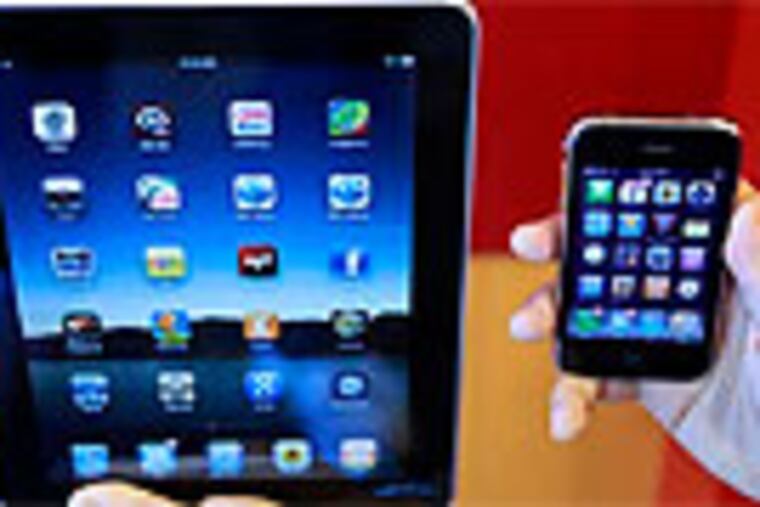Consumer 10.0: AT&T pricing plan may not help some iPhone users
Ask iPhone users about their life with Apple's signature smartphone, and sooner or later you're likely to hear this: AT&T has a problem.

Ask iPhone users about their life with Apple's signature smartphone, and sooner or later you're likely to hear this: AT&T has a problem.
Apple markets the iPhone as the ultimate tool for the mobile Internet, good not just for e-mail - that's for corporate drudges wed to BlackBerrys - but for surfing the Web, streaming audio, even viewing video.
But Apple's exclusive deal with AT&T locked iPhone owners into a network that, to put it politely, often doesn't work very well - and seems to work worse as AT&T and Apple sell more iPhones.
As an iPhone user, I know AT&T's problem firsthand. There are places I no longer even bother to try using my phone. At times I'm surprised when it works.
But I'm skeptical about AT&T's planned solution: Come Monday, it will no longer offer new customers its $30-a-month, all-you-can-eat data plan. Instead, they'll pay $15 a month for up to 200 megabytes of data, or $25 for up to 2 gigabytes. If they go over the limit, AT&T will charge them $10 a gigabyte.
On the face of it, I could benefit from the new pricing. Like nearly two-thirds of iPhone customers, I use less than 200 megabytes a month. AT&T says just 2 percent of users - the true data hogs, it implies - would actually run over the $25 plan's 2-gig limit.
So why won't I rush to switch plans? And why do I worry that AT&T is shooting itself - and Apple, and the whole mobile-Internet enterprise - in the foot?
The short answer is that although I'm not one of the data hogs, I could be - if my phone actually lived up to its promise.
Last I checked, for instance, I still couldn't get data at Philadelphia's Citizens Bank Park during a Phillies game. And I've barely scratched the surface of all the incredible applications that Apple markets through its online App Store.
I'm hardly alone. According to the latest report from the Federal Communications Commission, iPhone users already use an average of 275 megabytes - five times as much as BlackBerry users, and almost twice as much as other smartphone users.
And all those numbers are probably rising rapidly, according to Roger Entner, senior vice president at Nielsen Customer Value Metrics.
To get a better handle on the market, Entner recently crunched Nielsen wireless-bill data to examine how demand had changed when comparing 2009 with the first quarter of this year.
Entner found that average data use had nearly tripled, rising from 58 megabytes per month to 173 megabytes. And even when he lopped off the top 1 percent of users – the biggest data hogs that most worry the carriers – he found a sizable jump among high-end users.
Last year, the 99th-percentile customer – the theoretical customer who used more data than 99 percent of all wireless subscribers – averaged 1.1 gigabytes a month, Entner says. For the first quarter of 2010, he says, that same customer averaged 2.5 gigabytes per month -- more than twice as much.
Entner, for the record, welcomes AT&T's attempt at "congestion pricing" - using price signals to limit demand so that the network works better for everybody.
"They want you to use it," he says of AT&T. "They just want you to pay for what you use - the same as when you use water or milk or ice cream."
Entner says AT&T had little choice, because AT&T faced "a fundamental mismatch between limited revenue and unlimited costs" and is managing access to a finite resource, wireless spectrum.
Still, I'm not alone in my skepticism, or in my worry that AT&T's attitude could slow the growth of one of our economy's most dynamic sectors by scaring off experimentation among customers and software developers.
"Today's heavy user is tomorrow's average user," says M. Chris Riley, policy counsel for Free Press, a Washington media-advocacy group.
Riley says AT&T's current problems have little to do with technological or spectrum limits, even though he agrees that managing spectrum is a crucial long-run challenge.
"This is the story of a wireless carrier that is determined not to invest enough to meet the demand of users, but has decided to manage its network as a scarce resource," Riley says. "This is what Wall Street loves: Reduce your expenditures and increase your revenues."
Indeed, since 2007, Verizon has outspent AT&T on network investment for three straight years, the FCC says.
Consumer advocates such as Riley say the real answer is for the FCC to take steps to foster greater competition among wireless carriers. One key step would end handset exclusivity - the practice that allows AT&T to make sure my iPhone won't work on another carrier's network.
Who knows? If I had a genuine choice of carriers, maybe I could find one that could make my iPhone actually work.